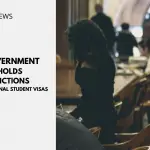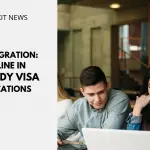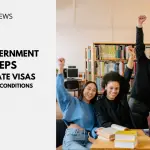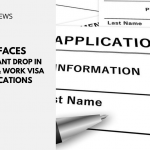COVID-19 Student Visa Restrictions Lifted: Tier 4 Student Visa Guidance
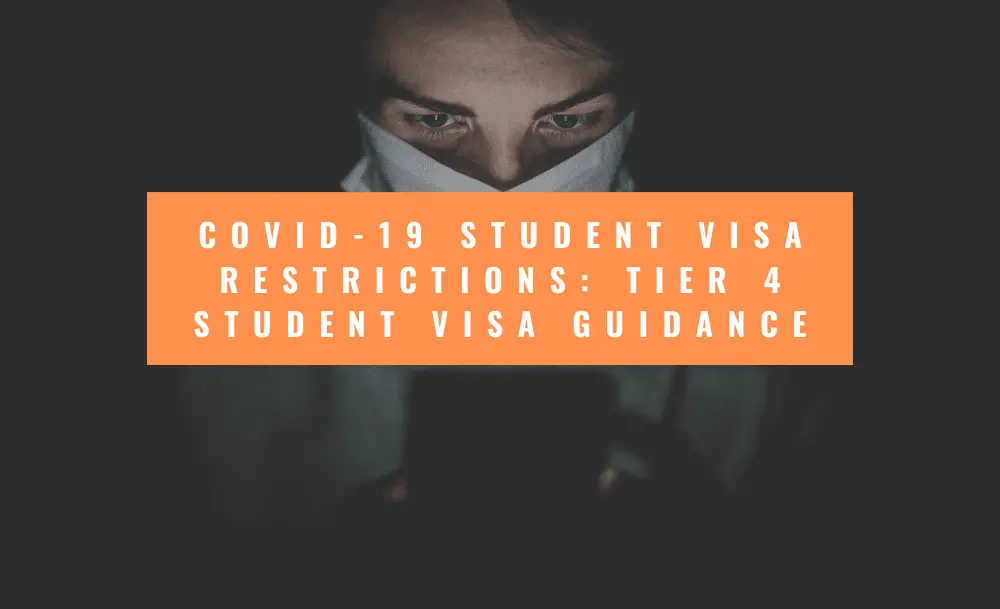

Although international travel has come to an almost standstill, there are a number of international students in the UK and stranded abroad. Students caught up at this time face number of issues because of COVID-19 student visa restrictions.
On 17 April 2020, the UK government's Home Office, responsible for UK Visas and Immigration, released guidelines for Tier 4 Sponsors, Migrants, and Short-term students during the COVID-19 pandemic. This is just a highlight of the concessions the government has temporarily put in place while we are battling the COVID-19 outbreak. You may refer to the official government website to get the full details. This is updated guidance from the 27th March update related to employers and sponsors under Tiers 2, 4 and 5.
As you already know; to get a visa to study in the UK, or to extend your student visa, you need to be studying at a regulated school or educational institution. That educational institution needs to be registered with the UK Visas and Immigration (UKVI) to be able to sponsor you and issue you a Certificate of Acceptance of Studies (CAS). With that certificate, you can apply for your UK student visa.
Once you are in the UK, and your course has begun, your educational institution (like University) becomes responsible for maintaining and reporting requirements such as your attendance at school. They will have a duty to cancel your sponsorship if you are not complying with your studies or your visa. Cancellation of your CAS will lead to you having to leave the UK or have another place to study, where permitted.


What are the usual Tier 4 student visa restrictions?
Outside of the coronavirus pandemic, Tier 4 student visa restrictions are things that you are not permitted to do whilst you are on a UK student visa. They fall into a number of things you were not able to do such as:
- you are able to study for the length of your course plus a few months, depending on the length of your course.
- Your ability to work was limited to the type of institution you are studying at and the length of course.
- Even with the ability to study, you are limited to 20 hours during term time and can do full time in the holiday period.
- You could only undertake certain types of jobs, depending on the type of student visa you are on.
- You could only apply within the UK if you were already a student or a limited number of other visas that you could switch from or into.
- You can only study in the UK for a permitted number of years, depending on the courses you took and the education institution you studied at.
- You are restricted to a type of courses you can study for and at what level, depending on your background and qualification
- Other types of procedural restrictions included
- when you could make your application
- when your certificate of sponsorship was valid to apply.
- specific ways to prove your qualifications
- proving your funds and access to funds for both your course fees and your ability to financially look after yourself (maintenance).
- your ability to bring dependants with you.
The above are basic checks that will need to be made when conducting a visa application checking process. In current climate, the student visa guidance has been amended temporarily to take account of covid-19 student visa restrictions being lifted or relaxed. Below are the various restrictions that have been relaxed or removed in the meantime.


Attendance Monitoring and Distance Learning
Because of the coronavirus pandemic sweeping the world, if you are a Tier 4 student and are absent for an extended period of time due to coronavirus, your University (or school) need not be report it to the Home Office. This is a departure from the pre-COVID 19 days where any absences were needed to be reported by the sponsoring educational provider.
As the number of Universities and and Schools (Sponsors) have switched to distance learning using software such as Zoom, learning has continued online by many education institutions in the UK. This is considered as distance learning by the Home office. Previously, educational institutions were unable to admit you to their courses, and sponsor you for your student visa if you were intending on studying on a distance learning program. But due to the coronavirus pandemic, distance learning has become the new normality in the UK.
As a result of this change towards a new method of learning, The UK government has permitted sponsors to continue this method of teaching whether the student is in the UK or outside. Sponsors will however still be responsible for you, as the student, as from the date that they issued your CoS (certificate of Sponsorship). Sponsors do not need to report where a Tier 4 student is now distance learning within or outside the UK.
The Home Office has confirmed that a student continuing his/her studies overseas will not be considered in breach of their student visa status. This means that any students who have chosen to continue their studies overseas will not have their sponsorship withdrawn during this period and the Tier 4 visa will remain valid. It also means that where you currently are located in the world, your UK student visa will still continue to be valid.
Regardless of these new COVID-19 student visa restrictions being lifted, your educational institution still has a duty to monitor you and your attendance the best way they can and using available tools for monitoring absences and illnesses etc. They will not be under a duty to report you, and in some instances, will not even have the ability to report you. The new rules just relaxes a number of requirements for sponsors. The Home Office will still be looking at how an Educational institution behaved during this relaxation of immigration rules and procedures.
Most educational providers also have Educational Oversight (EO) bodies, such as OFSTEAD, that regulate the provision of education in the UK. The Home Office will also be looking at how these sponsors relationships with their EO bodies were conducted during this pandemic.


Sponsor compliance for COVID-19 student visa restrictions
Sponsors are reminded to maintain records of students who are absent and update student records like contact information.
Sponsors are also encouraged to monitor attendance when students log into online learning portals, attend virtual lectures and tutorials, and submit work online. However, UK Visas and Immigration (‘UKVI') has confirmed that it will not take any action against sponsors who are unable to monitor online contact points due to practical or technical limitations.
Where a student has withdrawn from studies due to the coronavirus and is not to return, this will not count against an educational institution's record keeping of students.
Validity of issued Confirmation of Acceptance for Studies (CAS)
The Home Office will check the new applications individually and will take the following considerations regarding the validity of CAS:
- Tier 4 visa applications can still be made with CAS that was already issued with course start dates later than the intended date or the CAS has expired.
- The CAS has been tagged as assigned and the sponsor has updated the record with a new start date.
- The CAS has been marked as used or has expired however the student was unable to travel because of the outbreak travel restriction.
UKVI are expecting that a number of international students have been unable to travel to the UK due to covid 19. As a result, if you have already made your Student visa application and have been unable to travel, your ability to travel to the Uk to resume your studies will be protected.
If you still have not been able to make your visa application to come to the UK yet, you will be able to make such an application once the facilities reopen again. You can use the current CAS that you have already been issued.


English language requirements and pre-sessional courses
Where a student is unable to take Secure English Language Testing (SELT), certain institutions can assess the language proficiency of the student and this should be recorded on the CAS.
As the number of facilities worldwide is closed for testing, you may find it hard to prove your English language capability for the course you intend to study on. The lifting of COVID-19 student visa restrictions for English requirements means that if you are unable to take the required English Language courses and pre-sessional courses, your educational institution now has the ability to certify you as meeting the requirements as part of their intake process. This temporary way of vetting your proficiency in the English language for your course will need to be noted on your CAS.
Tier 4 visa extension
The Home Office confirms that students whose leave expires between 24 January 2020 and 31 May 2020 who would otherwise be unable to extend in the UK (in-country) can exceptionally apply for further leave within the UK. This will allow a student who was unable to complete his/her course due to the outbreak to complete an existing course or start a new course as long as the requirements are met.
This is probably one of the most radical changes by COVID-19 student visa restrictions being lifted. Reading this with the other changes, a number of scenarios mean that:
- If you are in the UK and cannot extend your student visa anymore, you may be able to switch into another category that you may not have been able to do ordinarily.
- It also potentially means that you will be able to switch into a student visa route in the UK even if you may not have been able to do so ordinarily.


Student working rights & hours
Tier 4 students who have work rights and are employed by an NHS trust as a doctor, nurse, or paramedic will not be limited to work 20 hours per week. Meanwhile, Tier 4 students with work rights whose sponsor suspends all study as a result of the outbreak will be considered to be in vacation time thus will be permitted to work full-time during this period.
Switching from Short-Term Studies to Tier 4
Switching into Tier 4 from short-term routes including Visit and Short-term Study will be allowed until 31 May 2020 on an exceptional basis. Applicants should meet the other requirements of the route such as maintenance. Applicants will be able to start the new course of study before the approval from the Home Office however the sponsor must terminate its sponsorship and teaching of the student if the application is rejected.
Until the pandemic is mitigated, we can expect further concessions or changes released by the Home Office.
Sources:
COVID-19: Guidance for Tier 4 Sponsors and Migrants and for Short-term students
- Citizenship Demand Soars in Germany - 16 November 2024
- Spain to End Real Estate Route in Golden Visa Program by January 2025 - 15 November 2024
- No ETA Required For French Schoolchildren To Visit UK - 14 November 2024

